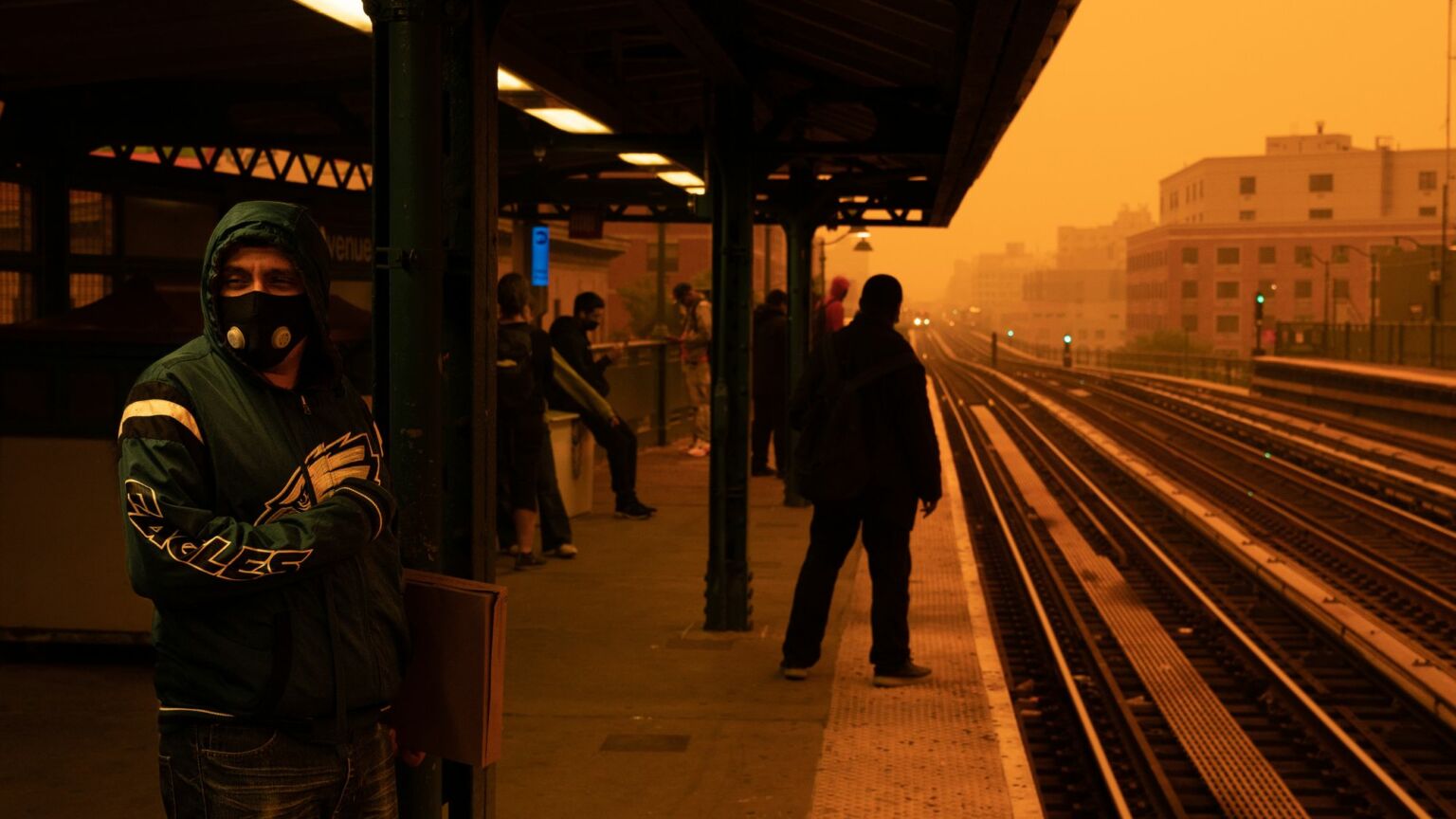
The end of the world is not around the corner
Environmental predictions about the End Times have a long and embarrassing history.
Want unlimited, ad-free access? Become a spiked supporter.
The end of the world is in sight. Hell on Earth is around the corner. Or at least that’s the impression you get from the overheated predictions that are continually made about the climate these days.
Today, we’re told the world is no longer reckoning with mere climate change, but with ‘climate catastrophe’. Not global warming, but ‘global boiling’. A ‘mass extinction event’ is upon us, says Greta Thunberg. ‘I am talking about the slaughter, death and starvation of six billion people this century’, warns Roger Hallam, co-founder of Extinction Rebellion, who dubiously claims that he has ‘the science’ to back this up. The ‘collapse of our civilisations and the extinction of much of the natural world is on the horizon’, insists David Attenborough. Scarier still, the narrow window for saving humanity from eco-armaggeddon is apparently always just about to close shut. Or so scientists and activists say.
These kinds of predictions come cloaked in the authority of science. They’re given a huge amount of weight by well-credentialed academics and venerable institutions. But that is no guarantee that they will come true. To put it lightly.
Indeed, predictions of environmental doom have been made before – and they have been very, very wrong before. According to some of the earliest luminaries of the modern environmental movement, we should probably all be dead already. It seems we’ve actually been living in the End Times for a very long time now.
The scientific consensus around global warming didn’t fully emerge until the 1980s. Nevertheless, environmental scientists have always been convinced that changes in the climate could pose an existential threat to humanity. Ironically, in the 1960s and 1970s, some scientists were more concerned about the alleged threat of global cooling than they were about warming. ‘Are we heading for an ice age?’, the Sunday Telegraph asked in 1979.
The potential for the world’s ecosystems to collapse has long kept environmentalists awake at night. From the 1940s to the 1960s, it was widely believed that ‘soil erosion’, caused by excessive farming, would turn once fertile lands into uninhabitable deserts. Rachel Carson’s 1962 book, Silent Spring, predicted that the use of pesticides would lead to a future of barren farmland and an epidemic of cancers and birth defects.
Paul Ehrlich – the author of the landmark 1968 book, The Population Bomb – believed that famine would soon result from ‘overpopulation’. The growth of the human population, he claimed, would quickly outstrip our ability to feed ourselves. ‘In the 1970s and 1980s, hundreds of millions of people will starve to death’, he warned.
As you’ve probably noticed, none of these fears about famine or ecosystem collapse has come to pass. The world population has more than doubled since Ehrlich’s book came out, but starvation rates have plummeted. Crop yields have only grown – not least because we’ve made huge strides in agriculture. Today, we can feed seven billion people far more easily and cheaply than we could feed three billion people back in the 1970s.
Another apocalyptic threat was said to come in the form of air pollution. In 1970, the year of the first ever Earth Day, Life magazine warned the world that ‘scientists have solid experimental and theoretical evidence’ that air pollution would overwhelm us all. It claimed that by the 1980s, ‘urban dwellers will have to wear gas masks’ just to survive. By 1985, the global smog epidemic would supposedly reduce the amount of sunlight reaching Earth by up to a half – triggering a sort of reverse-greenhouse effect. As a result, according to ecologist Kenneth Watt, ‘None of our land will be usable’.
Also in 1970, Nobel Prize-winning biochemist George Wald contended that thanks to overpopulation and air pollution, civilisation itself ‘will end within 15 or 30 years’ – giving humanity until 1985 or to the year 2000, if we were lucky.
He wasn’t alone. Many environmentalists feared humanity would struggle to make it past the millennium. In 1982, the head of the UN’s environment programme warned that by the year 2000, the Earth will have endured ‘an environmental catastrophe’ as devastating and irreversible ‘as any nuclear holocaust’. In 1989, another senior UN official predicted that ‘entire nations could be wiped off the face of the Earth by rising sea levels’ by the turn of the century. ‘If I were a gambler’, Paul Ehrlich wagered in 1971, ‘England would not exist by the year 2000’.
Yet even by the time the year 2000 came around, even as life in England stubbornly carried on, the environmental fear-mongers only doubled down. Dr David Viner, a senior climate scientist at the University of East Anglia, predicted that within just a few years’ time, thanks to global warming, snowfall would become ‘a rare and exciting event’. ‘Children just aren’t going to know what snow is’, he told the Independent. The next year, one of London’s airports had to be closed due to blizzards. Three years after that, Britain enjoyed a white Christmas. (Conveniently, the Independent’s report has since been airbrushed from the internet, but it has been archived here.)
In 2004, the Observer uncovered a terrifying internal memo from analysts at the Pentagon. It claimed that unless climate change was tackled urgently, then the UK and much of Europe would be plunged into a ‘Siberian’ climate by the year 2020. Apparently, climate change carried not only the risk of rising temperatures and adverse weather events, but also ‘nuclear conflict, mega-droughts, famine and widespread rioting’. As we now know, 2020 was indeed a challenging year across the world thanks to the Covid-19 pandemic, but not for the reasons the environmentalists predicted.
The climate campaigners don’t just want to scare us for the sake of it – they also want to harry us into taking action. They want us to wind down our use of fossil fuels, to cut down on travelling, meat and heating. To this end, they have presented us with a series of supposedly critical deadlines. On 21 June 2018, Greta Thunberg tweeted an article that claimed climate change ‘will wipe out all of humanity unless we stop using fossil fuels over the next five years’. By the time 21 June 2023 came around, and the world had not stopped using fossil fuels, the tweet had been deleted. ‘We have 18 months to stop climate-change disaster’, warned then Prince Charles in May 2008. Eight months later, he extended his deadline to 100 months. A high-profile Guardian campaign, featuring a ticking doomsday clock, set the tipping point at the end of 2016. That deadline also came and went without much notice.
Today, some of the most alarmist voices no longer bother making predictions. Instead, they say the climate catastrophe is already upon us. The media bombard us with a daily diet of fear-mongering about flooding, wildfires and hurricanes, which are supposedly more violent and dangerous than ever.
But this apocalyptic mood music simply cannot be squared with the facts. The rarely spoken truth is that the number of people actually being killed by climate is extremely low. In fact, it has actually decreased, even as global temperatures have risen. Climate-related deaths have fallen by as much as 97 per cent over the past 100 years, because economic development has fortified humanity against nature. The economic cost of these disasters has fallen as well, from about 0.25 per cent of GDP to around 0.2 per cent over the past 30 years.
Green prophecies of doom have often been ridiculous on their own terms. But there is another reason why such fear-mongering is always destined to be proven wrong. Environmentalists fail to recognise what is special about humanity. They ignore our capacity to overcome the challenges we face through technological, economic and social progress. They have forgotten that we have been emancipating ourselves from nature since the dawn of time. We do not have to passively accept what ‘the climate’ throws at us. We are able to shape our own environments according to our needs. And we are constantly improving our resilience in the face of natural disasters and other threats.
The fatal mistake of the doomsters is that they keep betting against humanity.
Fraser Myers is deputy editor at spiked and host of the spiked podcast. Follow him on Twitter: @FraserMyers.
Picture by: Getty.
You’ve hit your monthly free article limit.
Support spiked and get unlimited access.
Support spiked and get unlimited access
spiked is funded by readers like you. Only 0.1% of regular readers currently support us. If just 1% did, we could grow our team and step up the fight for free speech and democracy.
Become a spiked supporter and enjoy unlimited, ad-free access, bonus content and exclusive events – while helping to keep independent journalism alive.
Monthly support makes the biggest difference. Thank you.











Comments
Want to join the conversation?
Only spiked supporters and patrons, who donate regularly to us, can comment on our articles.